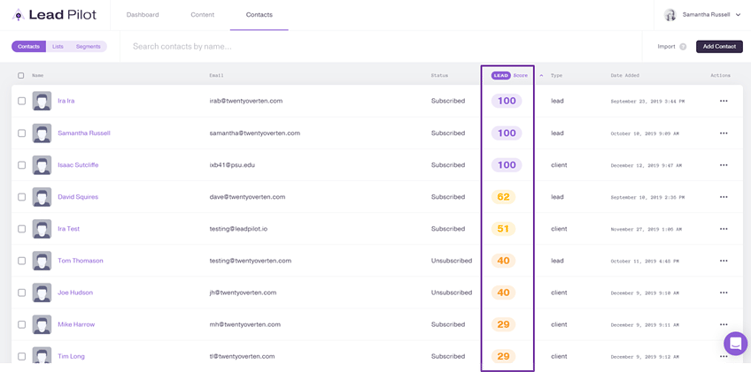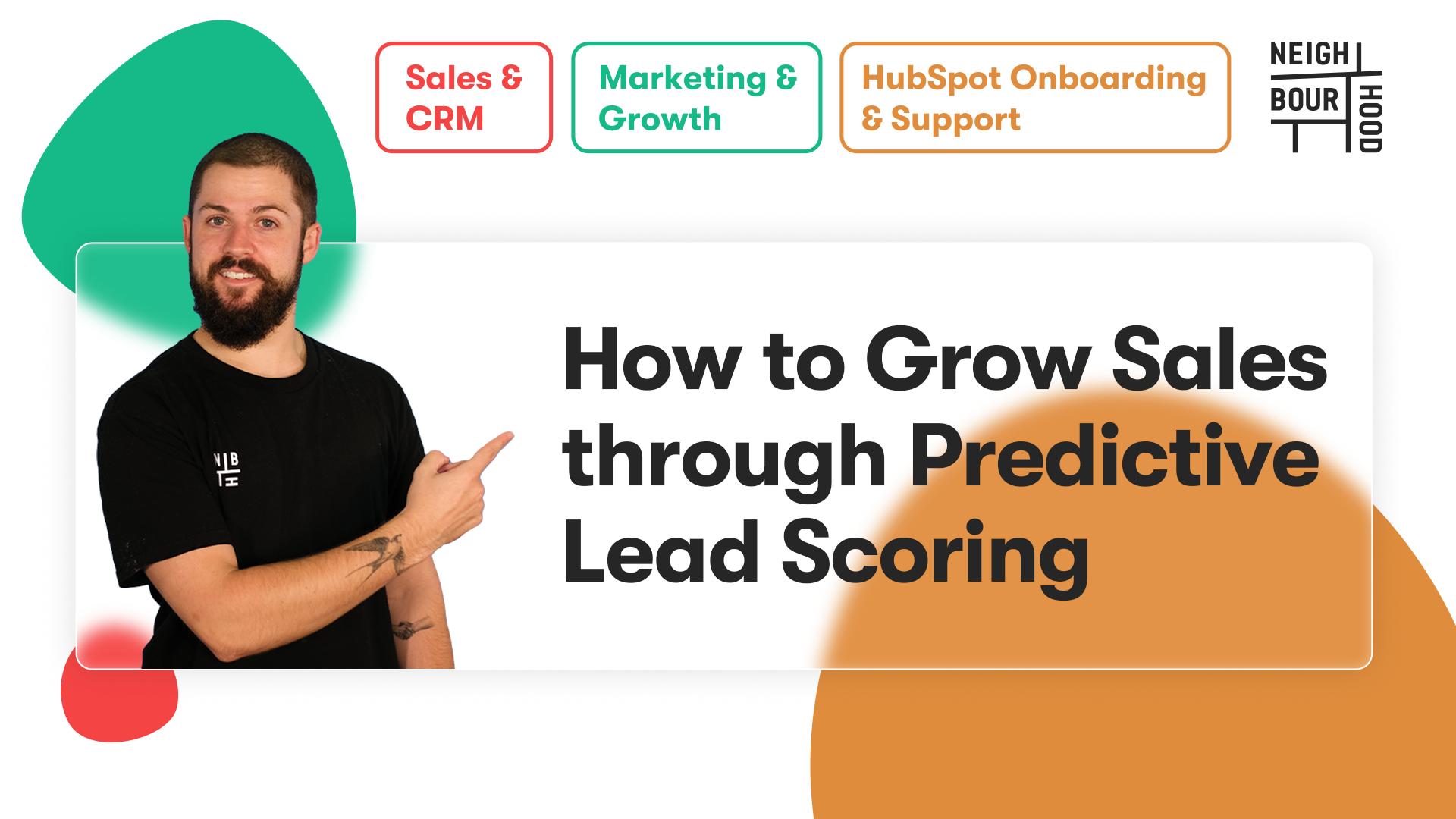Take a seat! Let me ask you this: is your business using predictive lead scoring to identify sales leads while finding ways to convert prospects? If not, then I'm sorry to say that you may be missing out on some of your best prospects in helping you boost sales.
Every one of us gets a sales call (or email, or text) from time to time. The chances are, you’ll get less annoyed at a midday sales call that actually blabbers on a product or service that you might actually use. This is also why lead generation is one of the most crucial parts of a business. You want to find a particular set of people that are most likely to engage with and purchase from a brand. It definitely beats targeting anyone, and everyone, just to see what works to meet sales targets.
So, if you’re like us, you’ll probably be curious to know who your best potential prospects are. Who doesn’t? Nobody likes to waste time on a hard-to-get prospect while missing valuable opportunities with their best leads. That’s where lead scoring comes in.
What is lead scoring?
Lead scoring is an essential process that ranks all prospects of a business on a scale, assigning a score to each based on the perceived value of what they can bring to the brand. The score will be a benchmark for the ways, frequency and priority in which these prospects will be targeted and engaged with.

Sales and data teams utilize relevant information such as demographic traits determine each lead’s score. This could also be action data insights such as search behaviour or website visit frequency. In a nutshell, any action or characteristic that indicates a potential to purchase will classify someone as a lead.
Have you ever gotten a bunch of emails right after filling in an online form? That’s because you are now an important lead to the business!
Why does lead scoring matter?
The importance of lead scoring comes in when you realise that a sales team could receive anything between ten to thousands of leads every day. That’s a lot of leads.
Sales reps have to reach each potential customer in an optimal time frame in order to secure their interest. This could be a matter of within a day or week. However, when leads are flowing in constantly, not every lead can be targeted within the optimal time period. Lead scoring enables sales teams to make better decisions on prioritizing those with higher chances of conversions before the ‘low chance’ prospects.
Time is of the essence in any business – and putting hours into the wrong people can deplete business resources quickly. More than that, it takes away valuable resources that can be put into closing more deals and generating revenue. You don’t want to waste hours calling an ill-suited lead while other eager prospects are being courted by a competitor. Still, it’s worth noting that while low-priority leads aren’t exactly a futile effort. There may be a less lucrative opportunity here that can be looked at later on.
To look at it another way, it’s something like what you would do on a dating app – invest in the ones that show you the most interest or potential, while still keeping the lazy texters at bay.

With that being said, lead scoring can help provide accurate evaluations into where the sales teams can invest their time and effort. Predictive lead scoring empowers teams with the right insight into where their most crucial sales opportunities lie.
Predictive lead scoring
Determining lead scores isn’t just about measuring anything you know about your prospects. Traditionally, lead scoring takes on a more one-dimensional approach where marketers rank leads based on a predetermined set of actions that display customer intent. For instance, a prospect who emails the company about an enquiry will receive a higher score based on engagement, as compared to someone who just drops in on the website.
But here’s the thing – despite companies relying on this methodology for years, there are certain limitations to traditional lead scoring. Newsflash: sales teams don’t usually run a tight ship, which is great for perspective. However, leaving lead follow-up to intuition and subjectiveness isn’t the best approach for accuracy. Perhaps this is due to a salesperson’s past experiences, or pure instinct. Processes that don’t follow a standard procedure run the risk of missing out on quality potential customer due to misjudgement and biases.
What is predictive lead scoring?
Predictive lead scoring is the process of using historical and activity data to identify a business’ best leads. Predictive modelling algorithms study the relevant information from past and current prospects and customers to generate predictions about possible outcomes. From this, you are able to better identify buyer profiles and ideal customer types and track these traits in their prospects to determine the best fit. Because of its machine learning and analytical capabilities, predictive lead scoring is a methodology that is free from human error or bias so you're more likely to end up with qualified leads.

Benefits of predictive lead scoring
Saves time and cost
A lead scoring model can be a time-consuming operation, since it involves crunching the numbers and evaluating leads as individuals. Luckily, if you’re tired of clocking in overtime hours, automating the lead scoring process will expedite the time it takes to analyse the quality of each lead. This frees up more time for you to spend on courting your best leads and getting them to love you back (please?). Additionally, lead scoring software has the ability to analyse large bulks of data, creating a cost-effective and scalable solution to lead management.
Gets results quickly
In today’s world, 1.145 trillion MB of data is created every day. That’s an insane amount of information for companies to look at. Now, if you have to manually compile and assess all this data, it will be a never ending process. Not to mention, results aren’t the most accurate either. The predictive lead scoring algorithm is able to generate results almost immediately, enabling sales representatives to conduct lead follow-ups before consumer shifts, pushing leads to sales.
Comprehensive results
Predictive lead scoring systems are driven by data, which they pull from multiple sources. We’re not just talking about internal data, but information from external sources such as third-party research and the web. This allows for a more comprehensive buyer profile based on demographic and behavioural traits.
Removes guesswork and human error
It’s hard to admit, but as amazing as your sales and marketing teams are, they’re still human. What this means is that each individual has their own experiences, biases and preferences. Pooled together, these are the things that can shape their unique definition of a ‘quality lead’. When perspectives differ across the board, it runs the risk of diverse opinions and inaccurate scores. Plus, given the amount of leads and data a company receives each day, there are bound to be a few profiles that slip through the cracks due to human error.
Predictive lead scoring is a data-driven methodology that removes the heavy reliance on guesswork and judgement for more accurate predictions. This leaves more space for information-driven decisions, making your sales efforts well worth it.
Align sales and marketing teams
What happens when marketing teams are passing on endless lists of leads and not seeing positive conversion rates from sales? Or maybe the sales department keeps getting leads that just don’t seem to be prospect material at all.
It can be taxing on organisational harmony and business objectives when two departments aren’t seeing their expected results. Predictive lead scoring enables sales and marketing functions to have a standardized definition of a ‘quality lead’. Creating this sales and marketing alignment between the two will empower teams to work better together and boost productivity.
Continual growth
There’s no doubt that technology is advancing every day. With that, predictive lead scoring technologies are just going to get better in functionality and accuracy as artificial intelligence improves. Even internally, organisations are getting more and more useful data in their knowledge base. Thus, as time goes by, you can expect to see more efficient usage of predictive lead scoring in your business.
How to incorporate predictive lead scoring into your business
Okay, so you’ve heard about predictive lead scoring. You know how it works. Now comes an important question: how do you get started?
Beyond the technology, it’s crucial for organisations to ensure that their culture and employees are aligned with this new change. It’s worth taking some time to explain, discuss and brief teams on predictive lead scoring, allowing them to understand the advantages and limitations of the new system. Then, it’s time to pick a software with the right capabilities. Of course, this depends on your organisation’s digital literacy, skills and needs. Luckily, there are many predictive lead scoring platforms that are fuss-free to install, with a user-friendly interface and a multitude of features.
The best part about predictive lead scoring is learning that business success doesn’t have to be complicated. Yes, we know – it takes a bit of time to set up and pick the right tools. But after that, your business tools do all the work for you.




